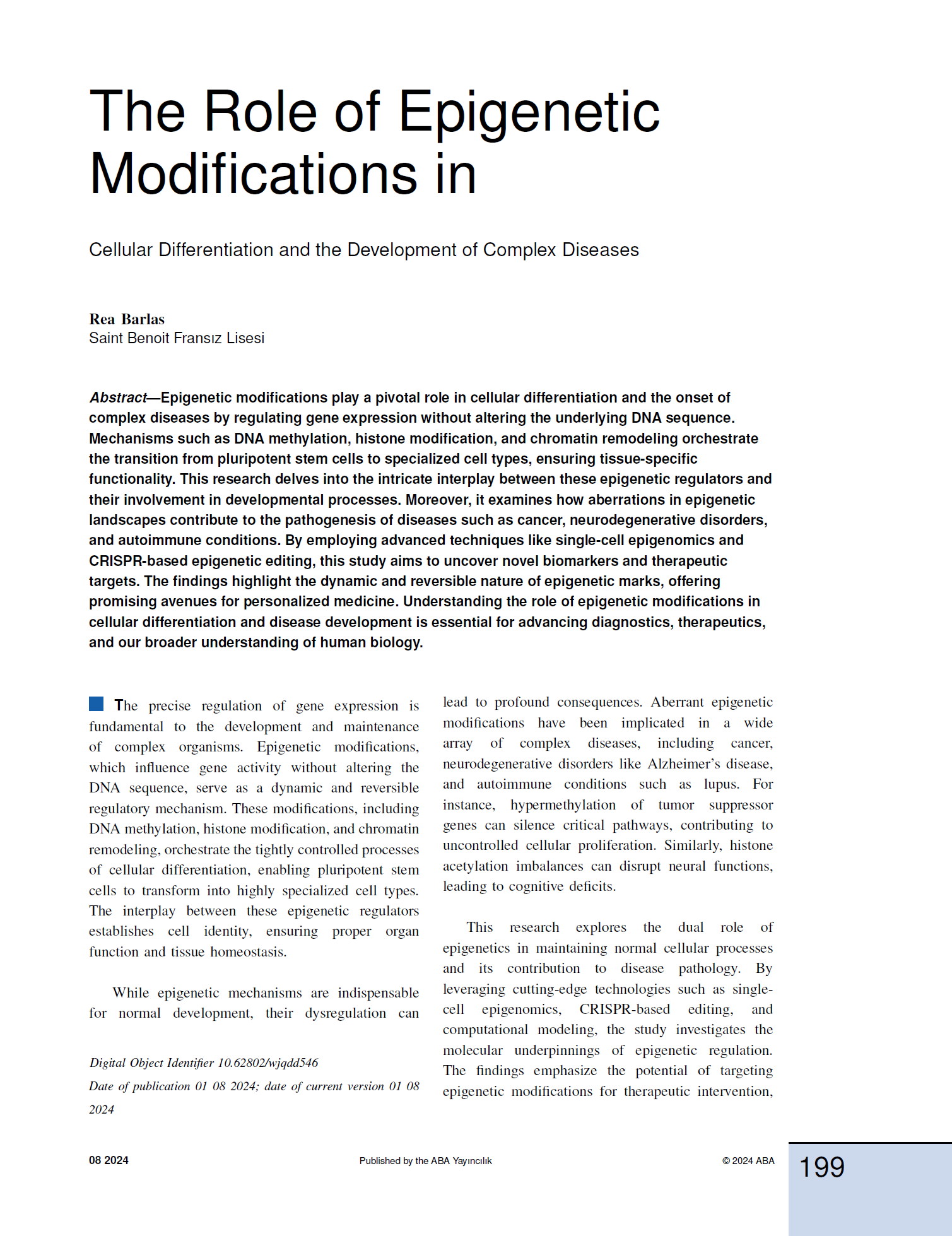The Role of Epigenetic Modifications in Cellular Differentiation and the Development of Complex Diseases
DOI:
https://doi.org/10.62802/d001wt61Keywords:
Epigenetics, Cellular Differentiation, DNA Methylation, Histone Modification, Chromatin Remodeling, Disease Pathogenesis, Biomarkers, Personalized MedicineAbstract
Epigenetic modifications play a pivotal role in cellular differentiation and the onset of complex diseases by regulating gene expression without altering the underlying DNA sequence. Mechanisms such as DNA methylation, histone modification, and chromatin remodeling orchestrate the transition from pluripotent stem cells to specialized cell types, ensuring tissue-specific functionality. This research delves into the intricate interplay between these epigenetic regulators and their involvement in developmental processes. Moreover, it examines how aberrations in epigenetic landscapes contribute to the pathogenesis of diseases such as cancer, neurodegenerative disorders, and autoimmune conditions. By employing advanced techniques like single-cell epigenomics and CRISPR-based epigenetic editing, this study aims to uncover novel biomarkers and therapeutic targets. The findings highlight the dynamic and reversible nature of epigenetic marks, offering promising avenues for personalized medicine. Understanding the role of epigenetic modifications in cellular differentiation and disease development is essential for advancing diagnostics, therapeutics, and our broader understanding of human biology.
References
Griñán-Ferré, C., Bellver-Sanchis, A., Guerrero, A., & Pallàs, M. (2024). Advancing personalized medicine in neurodegenerative diseases: The role of epigenetics and pharmacoepigenomics in pharmacotherapy. Pharmacological Research, 205, 107247.
Koijam, A. S., Singh, K. D., Nameirakpam, B. S., Haobam, R., & Rajashekar, Y. (2024). Drug addiction and treatment: An epigenetic perspective. Biomedicine & Pharmacotherapy, 170, 115951.
Long, Y., Mao, C., Liu, S., Tao, Y., & Xiao, D. (2024). Epigenetic modifications in obesity‐associated diseases. MedComm, 5(2), e496.
Luo, H., Li, Y., Song, H., Zhao, K., Li, W., Hong, H., ... & Zhang, Y. (2024). Role of EZH2-mediated epigenetic modification on vascular smooth muscle in cardiovascular diseases: A mini-review. Frontiers in Pharmacology, 15, 1416992.
Mijač, S., Banić, I., Genc, A. M., Lipej, M., & Turkalj, M. (2024). The Effects of Environmental Exposure on Epigenetic Modifications in Allergic Diseases. Medicina, 60(1), 110.
Paniri, A., Hosseini, M. M., & Akhavan-Niaki, H. (2024). Alzheimer’s disease-related epigenetic changes: novel therapeutic targets. Molecular Neurobiology, 61(3), 1282-1317.
Prabhu, K. S., Sadida, H. Q., Kuttikrishnan, S., Junejo, K., Bhat, A. A., & Uddin, S. (2024). Beyond genetics: Exploring the role of epigenetic alterations in breast cancer. Pathology-Research and Practice, 155174.
Tonti, E., Dell’Omo, R., Filippelli, M., Spadea, L., Salati, C., Gagliano, C., ... & Zeppieri, M. (2024). Exploring epigenetic modifications as potential biomarkers and therapeutic targets in glaucoma. International Journal of Molecular Sciences, 25(5), 2822.
Zhang, C., Meng, Y., & Han, J. (2024). Emerging roles of mitochondrial functions and epigenetic changes in the modulation of stem cell fate. Cellular and Molecular Life Sciences, 81(1), 26.
Zheng, J., Lu, Y., Lin, Y., Si, S., Guo, B., Zhao, X., & Cui, L. (2024). Epitranscriptomic modifications in mesenchymal stem cell differentiation: advances, mechanistic insights, and beyond. Cell Death & Differentiation, 31(1), 9-27.









